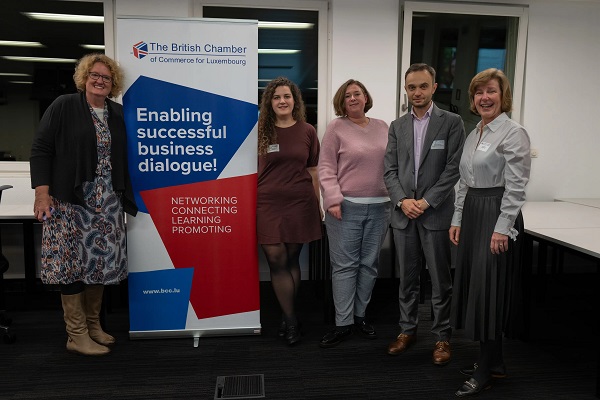 Credit: Ali Sahib
Credit: Ali Sahib
On Thursday 14 December 2023, the People & Leadership Group of the British Chamber of Commerce for Luxembourg (BCC) held an event dedicated to "Artificial Intelligence - Bridging the Knowledge Gap" at the Luxembourg School of Business (LSB).
This event followed the format of a "kitchen table conversation" (KTC), a "safe place" where - according to moderator Virginia Anderson - people have their "most fruitful" discussions, where they "tell stories and have disagreements", while discussing topics they consider to be important.
The main question was: how do we bridge the knowledge gap around artificial intelligence (AI) between educational institutions and business communities?
The panel consisted of the following educators, entrepreneurs and corporate leaders: Matteo Forgiarini, lecturer and Academic Director at LSB; Amy Lee, Upper School Assistant Principal for Teaching and Learning at the International School of Luxembourg (ISL); Nika Margeta, Senior Business Intelligence Engineering (BIE) at Amazon; Ariane Töpfer, manager and coach at Youth & Work. The moderator was Virginia Anderson, performance coach and trainer at Matrix Consulting Sarl.
The panellists brought their insight, ideas and questions to the ("kitchen") table - and sought more answers in order to start filling the knowledge gap. For example, AI is great but how can we help young people be more confident when looking for jobs? How can schools skill the new workers of tomorrow? How can they educate their classes fast enough to keep up with AI innovation?
As Virginia Anderson explained, the event "was not about answering the questions but having a conversation around a topic that affects all of us: AI in education and the workplace."
The audience also had their say on the subject, together investigating different possibilities and perspectives.
Some ideas that came up included the following: can we change the education system and teach in a different way? Why not just let AI take away the operational tasks so people can focus on the human skills that make us different? Participants also discussed the importance of looking at the ethical aspects and teaching children to make ethical choices concerning the use of AI. Another point related to trust and AI- for example, can we trust an AI doctor? Do we need a robotic answer or a person explaining the diagnosis with sincere empathy? Where does trust fit into the picture?
The discussions continued over a networking session.
"With the KTC, we created an environment of excitement and potential. It was good and I am happy," commented Virginia Anderson, adding: "Do you want to continue the conversation?"








